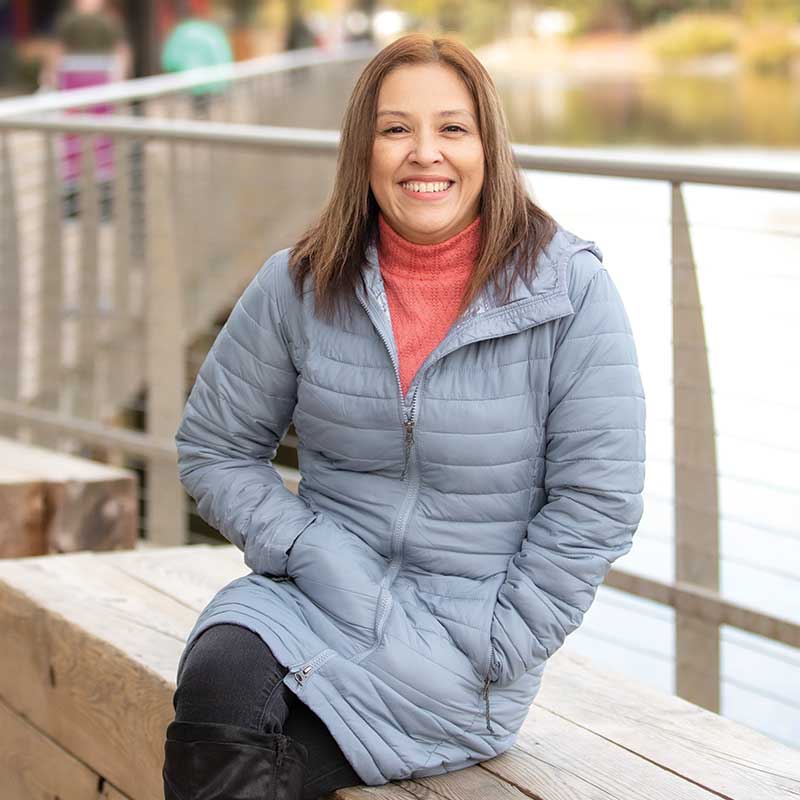Linda's Colorectal Cancer Story
Linda Gets the Best Present, A Clean Bill of Health
Linda Lopez Enriquez tried everything to make her stomach pain stop. “Everything I ate made me feel unwell,” she said. She changed her diet and started going to the gym. When Linda saw blood in her stool, she went to her primary care provider for an exam and had a series of stool sample tests, which came back negative. Still, her rectal bleeding became more frequent and the pain got progressively worse. A diagnosis eluded her — until she saw Halim Charbel, MD, gastroenterologist, who immediately scheduled her for a colonoscopy. “
If someone is having symptoms as Linda had, they need to be evaluated right away. Colonoscopy is the best way to screen for colorectal cancer,” Dr. Charbel said. “It is a safe and easy procedure. Some people are reluctant to have a colonoscopy because they are worried it will be painful, but that is not the case. You are asleep during the procedure and feel no pain afterward.”
For Linda, the test proved to be a turning point, revealing a 5-cm mass that appeared to be cancer. Dr. Charbel performed an endoscopic ultrasound for confirmation and to determine how advanced the tumor was. “Linda’s tumor was locally advanced, meaning it went beyond the bowel wall and some lymph nodes were involved. She would need chemotherapy and radiation prior to surgery,” said Dr. Charbel.

I am so grateful for the care I received from all my doctors and nurses at Holy Cross Germantown Hospital,” said Linda, who was only 44 years old when she was diagnosed with colorectal cancer.
Holy Cross Health takes a comprehensive, collaborative approach to cancer care, putting the patient at the center of the treatment plan. Rami Makhoul, MD, colorectal surgeon; Frederick Min, MD, medical oncologist; and Sheela Modin, MD, medical director of the Holy Cross Radiation Treatment Center, quickly came together to develop an individualized care plan for Linda that would offer the best outcomes. The first step was to aggressively treat the tumor with a one-two punch: chemotherapy and radiation at the same time. “Chemo-radiation is done to improve the outcome of surgery, decrease the risk of recurrence and increase overall survival,” Dr. Makhoul said.
The chemo given during radiation is a low dose, which is meant to make the cells more sensitive to radiation. The goal is to shrink the tumor, making it easier to remove completely during surgery.
Linda tolerated the treatment well, with some medication to manage side effects. “This approach typically results in a 70% to 90% reduction of the tumor, and 20% of cases have complete clearance of disease,” Dr. Modin said.
A CT scan showed Linda had an excellent response to chemoradiation. “By the time of her surgery, we couldn’t find any cancer,” said Dr. Min. “The residual tumor was less than one centimeter and the lymph nodes were clear.”
Dr. Makhoul performed Linda’s surgery robotically at Holy Cross Germantown Hospital using the da Vinci® Xi Surgical System. He removed the small residual tumor and reconstructed the bowels to create a temporary ileostomy, which was reversed eight weeks later to restore normal bowel function. Both surgeries went very well and Linda was back home quickly.
“Holy Cross has a well-established robotic colorectal surgery program with a highly-trained team,” said Dr. Makhoul. “The experienced nursing care on our surgical units expedites the recovery process for patients, enabling them to go home sooner.”
After surgery, Linda had additional chemotherapy to reduce the risk of recurrence and is in remission.
“As a single mother who tragically lost her husband, Linda faced a lot of stress,” Dr. Modin said. “Her willingness to go through such aggressive treatment is a testament to her strength.”
Linda will continue with routine follow-up with her cancer team and can take advantage of Holy Cross survivorship programs and guidance from our cancer nurse navigators to support her ongoing wellbeing.
5 Facts About Colorectal Cancer
If you’re 45, it’s time to get checked for colorectal cancer.
- Colorectal cancer is preventable, treatable, and beatable — as long as you get screened.
- Screening reveals polyps, which can take about 10 years to become cancerous. Early detection means prevention.
- The recommended age to begin colorectal cancer screening has been lowered to age 45 from 50 for individuals at average risk. Family history and certain medical conditions can put you at higher risk, requiring screening at a younger age. Talk to your doctor.
- It’s easy to have a colonoscopy — the best and most accurate way to screen for colorectal cancer. And, if polyps are found during a colonoscopy, they can be removed immediately.
- At any age, see your doctor if you have any of these symptoms:
- Rectal bleeding
- Changes in bowel habits, such as new or worsening constipation
- Unexplained abdominal pain
- Iron-deficiency anemia for no clear reason
Holy Cross Health is affiliated with highly skilled gastroenterologists, colorectal surgeons, and oncologists who can review your health care risks and talk with you about cancer screenings. Find a physician today.
